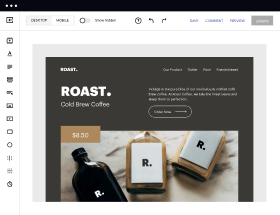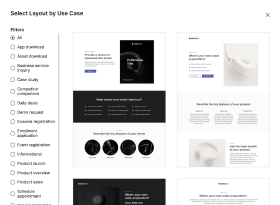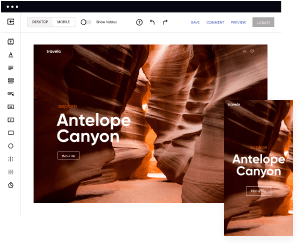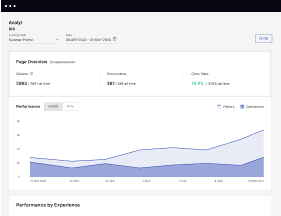Get a starting point with the PHP optimized glossary page template
Supercharge your glossary page with PHP for outstanding performance! Learn more today.

Easy to build without coding
With the intuitive drag-and-drop builder, anyone on your team can create high-converting pages without any knowledge of code or design. Make enhancements to your landing page with custom widgets using Javascript, HTML/CSS, or third-party scripts.
Multiple layouts for any industry and goal
Select from 500+ landing page layouts built to boost conversions across industry-specific scenarios. Customize them by adjusting fonts, adding images, and generating on-brand content with the AI assistant. Quickly scale with Instablocks® and Global Blocks that you can save, reuse, and update globally.
Loads fast and looks polished on any device
Every template is responsive, which means they present professionally on any device and load blazingly fast with our Thor Render Engine. You can also power them up with Google AMP technology to deliver an unparalleled mobile experience and drive higher conversions.
Robust analytics & experimentation
Get real-time updates and reporting across all your devices, showing the number of visitors, conversions, cost-per-visitor, and cost-per-lead. Launch AI-powered experiments, run A/B tests, and use heatmaps to analyze user behavior, then optimize your landing page to maximize conversions.
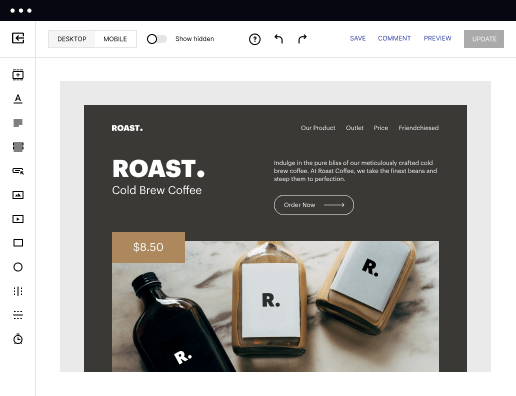
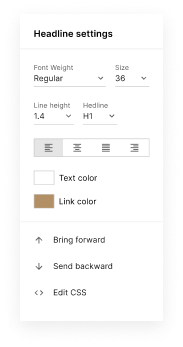
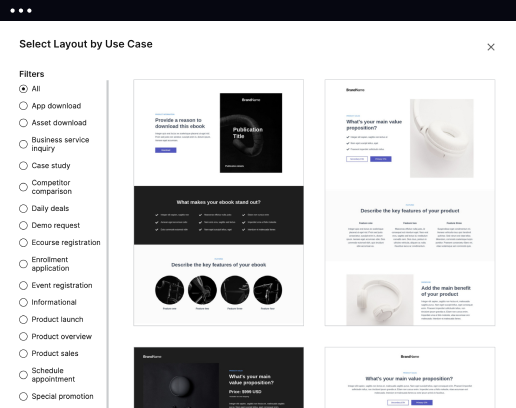
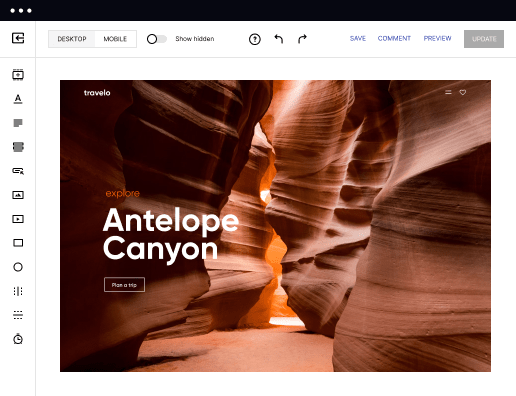
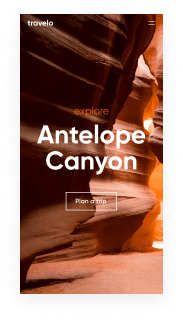
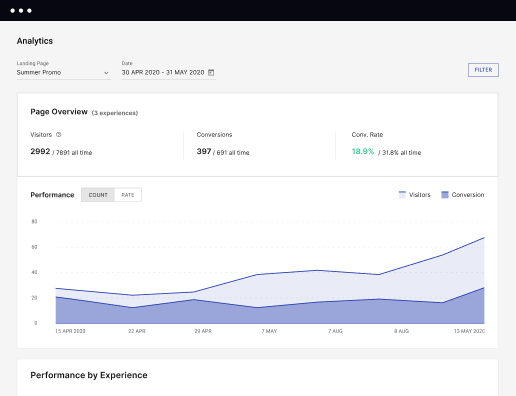
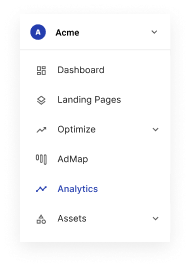
Easy to build without coding
With the intuitive drag-and-drop builder, anyone on your team can create high-converting pages without any knowledge of code or design. Make enhancements to your landing page with custom widgets using Javascript, HTML/CSS, or third-party scripts.
Multiple layouts for any industry and goal
Select from 500+ landing page layouts built to boost conversions across industry-specific scenarios. Customize them by adjusting fonts, adding images, and generating on-brand content with the AI assistant. Quickly scale with Instablocks® and Global Blocks that you can save, reuse, and update globally.
Loads fast and looks polished on any device
Every template is responsive, which means they present professionally on any device and load blazingly fast with our Thor Render Engine. You can also power them up with Google AMP technology to deliver an unparalleled mobile experience and drive higher conversions.
Robust analytics & experimentation
Get real-time updates and reporting across all your devices, showing the number of visitors, conversions, cost-per-visitor, and cost-per-lead. Launch AI-powered experiments, run A/B tests, and use heatmaps to analyze user behavior, then optimize your landing page to maximize conversions.
All the features you need to build lead-generating landing pages
Explore more featuresLearn how to build top-performing landing pages for any goal
FAQs
Leading the way in building high-performing landing pages





A comprehensive guide on using Instapage for effective landing page creation
Instapage stands out as the premier landing page and CRO platform that marketers can leverage to amplify, optimize, and scale their digital marketing efforts. With the right tools, businesses can create high-converting pages aimed at maximizing ROI effectively.
Understanding the power of Instapage
Instapage empowers marketers with a versatile and intuitive platform that fuels successful landing page development. With its robust optimization, personalization, and collaboration features, Instapage paves the way for marketers across various industries such as business services, tech/SaaS, education, and government to capture leads efficiently.
- User-Friendly Templates: Choose from over 100 high-converting templates to launch effective campaigns swiftly.
- Built-in Optimization Tools: Utilize A/B testing and heatmaps to enhance user engagement and conversion rates.
- Personalization Features: Leverage dynamic text replacement and AdMaps to target specific audiences effectively.
Step 1: Setting up your landing page
To begin with Instapage, you'll want to define your objectives. Understanding your target audience in sectors such as financial services or education will help tailor your messaging. Create a visually appealing landing page by selecting a template that resonates with your brand identity and campaign goals.
Step 2: Optimizing for conversions
After establishing the basic layout, it’s vital to implement optimization techniques. Ensure your call to action (CTA) is prominently placed and utilizes action-oriented language. Testing various headlines and layouts plays a crucial role in enhancing overall performance.
- Experiment with Different CTAs: A/B test phrases like 'Get Started' versus 'Join Us Today' to find what converts best.
- Use Heatmaps: Monitor user behavior and see where visitors click, allowing adjustments to improve engagement.
- Integrate Analytics: Assess the data collected to determine which elements need tweaking for maximum effectiveness.
Step 3: Analyzing performance and iterating
Once your landing pages are live, continuously monitor their performance using the analytics dashboard. Adjustments based on user interaction data are crucial for ongoing improvement. Establish a regular review schedule to reassess page efficacy.
- Review Conversion Rates: Keep an eye on how many visitors take the desired action to gauge success.
- Gather User Feedback: Conduct surveys or solicit feedback from visitors to find areas needing improvement.
- Regularly Update Content: Refresh your headlines, images, and offers to keep your pages engaging and relevant.
By following these steps, marketers in the USA and beyond can fully harness the capabilities of Instapage to create high-impact landing pages.
Start transforming your digital marketing strategy today with Instapage. Discover the difference that personalized landing pages can make in your conversion rates.
Crafting a dynamic PHP optimized glossary page template: A comprehensive exploration
Understanding the core concept of PHP-optimized glossary pages
A glossary page in web development serves as a valuable resource, providing definitions and explanations of specific terms relevant to a website's content. These pages are crucial for users, especially in technical or specialized fields, as they clarify complex terminology, thereby enhancing the user's comprehension of the topic at hand. More than just a collection of definitions, a well-structured glossary supports user navigation, offering instantaneous access to insights that enhance learning and understanding.
In addition to improving user experience, glossary pages play a significant role in search engine optimization (SEO). By providing clear definitions and structured content, these pages can increase a website's visibility in search engine results. When search engines index a glossary page, they recognize its relevance to specific queries, helping to drive organic traffic to the site. This symbiosis showcases the dual importance of glossary pages, making them essential to any online presence.
PHP-optimized templates leverage the flexibility of PHP to create robust, dynamic content. Optimization within this context refers to the enhancements made to speed, efficiency, and user engagement. An optimized glossary page template is designed to reduce load times, facilitate content retrieval, and improve the overall experience of users navigating through the terms. Key features that distinguish these templates from basic ones include efficient data management, effective caching mechanisms, and SEO-friendly formatting.
Benefits of using a PHP-optimized glossary page template
One of the primary benefits of employing a PHP-optimized glossary page template is the substantial improvement in load times, which directly enhances user experience. By utilizing PHP caching technologies, such as OPcache and Memcached, web developers can streamline content delivery. These technologies temporarily store frequently accessed data, ensuring that repeat visitors experience minimal loading delays, which is crucial for retaining engagement and reducing bounce rates.
An additional benefit is the dynamic content management and scalability that PHP offers. PHP allows for efficient handling of large datasets through its various database connections, such as MySQL or PostgreSQL. As organizations expand and their content needs grow, a PHP-optimized glossary page can easily adapt to accommodate an increasing number of entries without compromising performance. This scalability is invaluable for businesses and communities, allowing for continuous growth while maintaining a smooth user experience.
Furthermore, the optimization of glossary pages results in SEO advantages. Structured data plays a pivotal role in improving search engine visibility. By implementing schema markup, developers can ensure that glossary entries are understood by search engines, which can enhance click-through rates. Additionally, rich snippets generated from this structured data can grab users' attention on search result pages, making them more likely to engage with the content.
Essential components of a robust PHP glossary page template
For any PHP glossary page template to function optimally, efficient data retrieval techniques are vital. Utilizing well-structured SQL queries assists in optimal data collection from the database, ensuring that users receive relevant information promptly. A balanced approach that uses advanced PHP data structures for caching can significantly bolster performance, allowing for faster lookups of terms and definitions. Achieving this fine-tuned performance is essential for keeping users engaged.
In addition to efficient data retrieval, user-friendly front-end design is crucial. Responsive UI components play a significant role in enhancing user interaction, ensuring that the glossary is accessible across various devices. Integrating functional widgets can enhance the readability of definitions, offering highlights, examples, or even context that users may find beneficial. This focus on user experience helps to create a glossary page that is not only informative but enjoyable to navigate.
A search functionality that allows users to quickly locate terms enhances overall navigation. Implementing sophisticated search algorithms can provide fast access to terms and definitions, reducing frustration that users might experience when sifting through lengthy entries. Coupled with filtering options, users can navigate through terms more effectively, thus elevating the user experience and promoting longer site visits.
Innovative features of a PHP glossary page template
Incorporating Q&A functionality into a glossary page fosters community engagement. This feature allows users to pose questions related to specific terms, creating an interactive environment that encourages discourse and peer-assisted learning. By establishing a repository of user-contributed knowledge, businesses can enrich their glossary, transforming it into a more comprehensive resource.
Version control also plays a crucial role when updating content on glossary pages. Keeping historical records of definitions and changes provides transparency and integrity in content management. This not only helps users understand the evolution of terms but also protects against misinformation. Leveraging PHP frameworks like Git can simplify the implementation of version control, ensuring that each modification is tracked appropriately.
Moreover, collaboration tools enable teams to collectively edit and contribute to glossary content without confusion. Such features can facilitate real-time edits and feedback, streamlining the content production process. Allowing community contributions to glossary content enhances the richness of the entries, as different user perspectives can introduce diversity to the definitions and context provided.
Dynamic widgets can significantly enhance content presentation as well. For instance, interactive tooltips or pop-up definitions improve user engagement by providing on-demand explanations without directing users away from their current context. Such features can keep the users' learning experience fluid and intuitive.
Best practices for developing a PHP optimized glossary template
When developing a PHP optimized glossary page template, structured coding and modular techniques are paramount. By applying object-oriented programming principles, developers can create reusable components, enhancing both maintainability and scalability. Modular coding allows individual sections of the glossary to be updated or modified without impacting the entire structure, simplifying future enhancements and ensuring the application remains flexible.
Incorporating existing technologies and frameworks can streamline the development process significantly. PHP frameworks such as Laravel or CodeIgniter come equipped with tools and libraries that expedite glossary page creation, ensuring best practices are followed. Moreover, integrating front-end technologies, like HTML5, CSS, and JavaScript, allows for a richer user interface, combining PHP's server-side capabilities with client-side enhancements.
Finally, monitoring performance and user interaction is vital to ensure the glossary page remains effective over time. Utilizing analytics tools allows developers to collect data on user behavior, providing insights that can inform iterative improvements. Regularly assessing performance metrics helps identify bottlenecks and user pain points, making it easier to implement necessary adjustments to optimize the user experience continuously.
Ensuring security and accessibility in PHP glossary pages
Security should be a top priority when developing PHP glossary pages. Best practices include implementing robust security protocols, such as data encryption and secure user authentication measures. Addressing common vulnerabilities, like SQL injection and cross-site scripting, is crucial for protecting user data and maintaining the integrity of the site. Regular security audits can help to identify and mitigate potential risks effectively.
Accessibility is equally important in creating an inclusive glossary page. Techniques such as semantic HTML and ARIA roles can help make the content accessible to all users, including those with disabilities. Following the Web Content Accessibility Guidelines (WCAG) ensures that the glossary page is navigable and usable by diverse user communities. This commitment to accessibility not only enhances the user experience but also broadens the reach of the glossary and promotes a more equitable internet.
The future of PHP-optimized glossary pages
The landscape of PHP-optimized glossary pages is evolving with emerging trends and technologies. Advances in artificial intelligence and machine learning are likely to redefine glossary features, providing smarter ways to deliver content tailored to user preferences. As these technologies develop, we can expect glossary pages to incorporate predictive analytics that personalize term recommendations based on previous user interactions, further enhancing user engagement.
Additionally, community-driven innovations are set to play an essential role in content evolution. Engaging with users for feedback, updates, and contributions can provide fresh perspectives and insights, ultimately creating a more vibrant resource. The potential of user-generated content in evolving glossary offerings is immense, allowing businesses to leverage community expertise while building a sense of ownership and inclusivity.
In conclusion, the future of PHP-optimized glossary pages promises exciting possibilities, with technological innovations and community involvement at the forefront. By keeping an eye on these trends, developers can ensure that their glossary pages not only remain relevant but continue to serve as crucial resources for users seeking clarity and context in an ever-expanding digital landscape.
Ready to skyrocket conversions?
Supercharge your ad campaigns with high-performing landing pages
Get started



